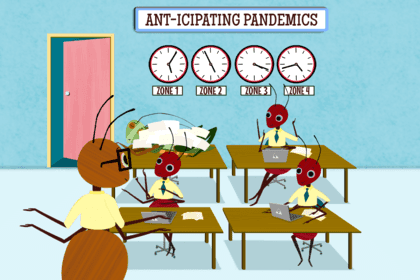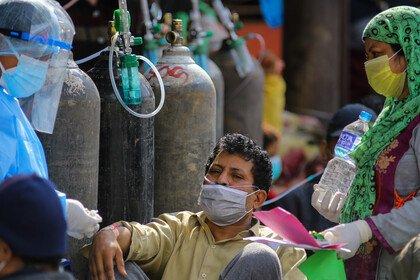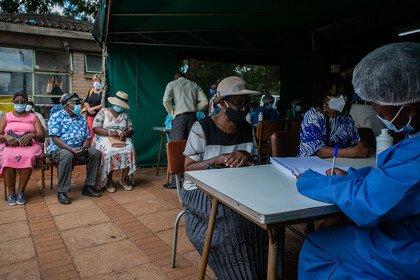
G7 progress against pandemic threats is promising – now they must act
After many global conversations about lessons we can learn from the Covid-19 crisis, the G7 summit in Germany showed increasing commitment to facing threats of disease outbreak. It’s time now to finally turn warm words into transformative action.

Sudipto Das / Wellcome Photography Prize 2021
With an understandable focus on other ongoing global events, there have been concerns that Covid-19 and pandemic threats have fallen off world leaders’ agendas. But behind the headlines on the summit, the G7 leaders’ communiqué does mark some notable – at times hard-won – progress, a credit to the German presidency bringing together a diverse group of stakeholders.
As the communiqué rightly notes, we are at “a critical juncture for the global community, to make progress towards an equitable world”. Communiqués are words, not delivered commitments – now the focus must be on achieving these.
Here are five ways to ensure that happens.
1. Develop a robust roadmap for the Pact for Readiness
The communiqué’s endorsement of the Pact for Pandemic Readiness marks a significant step in the right direction for building global response and resilience to the threat of escalating infectious diseases. This Pact will be crucial for monitoring and rapidly responding to novel pathogens which could cause the next pandemic, as well as existing threats such as Covid-19, monkeypox and drug-resistant infections.
With technical meetings on the agenda in autumn to develop the roadmap to implementation, it will be imperative to not only put a plan on paper, but also be clear who will be accountable for this.
2. Tracking progress
The Pact for Pandemic Readiness is not the first G7 initiative for pandemic preparedness. The 100 Days Mission, launched under last year’s UK Presidency, aims to reduce the impact of future pandemics through the ambitious target to develop vaccines, therapeutics and diagnostics within 100 days from pandemic detection.
Going forward it will be crucial that we regularly track progress towards the objectives we have set ourselves in both initiatives. Without a tracking mechanism, we will not know whether we are any more prepared for the next escalating infectious disease. While movement can be painfully slow, continuous and measured advances will get us to a better place to meet future pandemic threats.
3. Sustain financing on a global level for pandemic preparedness
No advances will be possible without sufficient and sustainable funding. That funding needs to be established urgently, before global memory fades.
The creation of the Financial Intermediary Fund (FIF) for Pandemic Prevention, Preparedness and Response (PPR) is an encouraging first step. Wellcome has committed £10 million towards the fund to strengthen PPR activities.
However, overall global early pledges are well below the budget recommendation from the G20 High-Level Independent Panel (HLIP). New priorities and threats will emerge that warrant attention and funding: falling into panic and neglect yet again is a real risk.
This new funding needs to come from a global pool. We must encourage all countries to prioritise this investment against future pandemic threats.
4. Don't forget about drug-resistant infections
We have in recent years seen similar commitments on drug-resistant infections and new incentives for antibiotic development in every leaders’ communiqué since 2016. Yet we have seen action from only a couple of members – leading to stalled advances in the antibiotic pipeline.
This lack of government action has meant that organisations such as Wellcome have had to step up through funding initiatives such as the AMR Action Fund.
Commitments must continue to be bold, ambitious and deliverable; governments must track progress, sustain this ambition and follow through with these promises.
5. Continue working together
At times, the world has shown astonishing levels of collaboration in responding to global disease outbreaks. That needs to continue – whether at a national level across ministries or global level across the G7 and G20 and across the global health organisations.
Building knowledge and trust will be critical in dealing with emerging threats. While the headway made on this during the pandemic has been commendable, there is always room for improvement. This collaboration will be key to ensuring the world does not retreat into nationalistic or organisational siloes which stop effective collaboration on preventing or fighting global threats of pandemics.
From Ebola to SARS, Covid-19 to monkeypox, successive governments have failed to adequately prepare for epidemic threats. We know how and what to prepare. Now is the time for world leaders to provide the sustained political will and financial commitments required to enable better preparedness.
While, politically, spending money ‘just in case’ can be challenging – these investments will pay off. We know it’s not ‘if’ but ‘when’ there will be another major virus threat and the better prepared we are the better we will contain the consequences.
This communiqué is a marker of good progress but there is still a long way to go highlighting the importance of continuing these discussions during the handover to Japan for the next G7 presidency in 2023.
We’re funding research to better understand what causes and drives infectious diseases to escalate and the solutions to control their impact.
There are currently no open funding opportunities for Infectious Disease. Learn more about the funding we provide.


